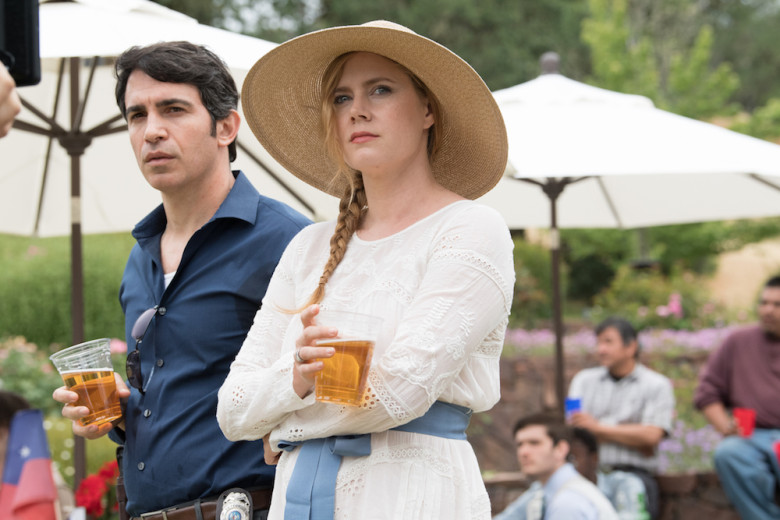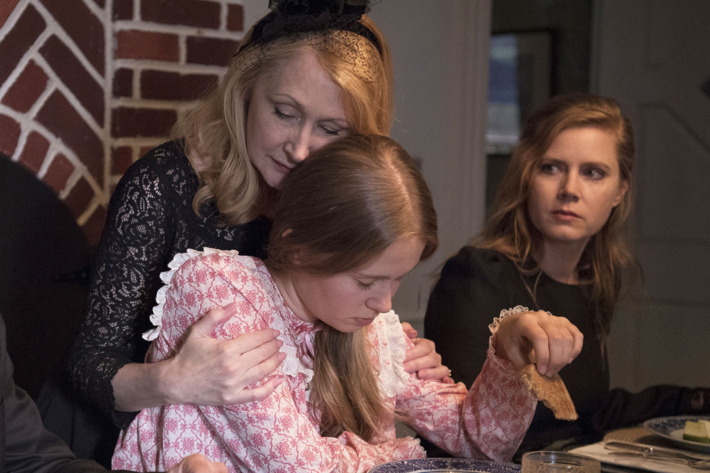In the stifling town of Wind Gap, Missouri, the ensemble of women who occupy the small Southern town are dangerous weapons, armed with their own trauma, damage and suffering.

HBO’s tantalizing new mini-series, ‘Sharp Objects’ magnifies the intensity of damaged women under the sweltering microscope of small town politics. In the latest episode ‘Closer’, the town pays homage to a silenced, abused wife of a Confederate soldier, whilst the present day murders of two young girls has the town folk up in arms. The baffling irony personified through a town, where women’s pain is unbelievably glorified and yet, condemned, has been explored in Sharp Objects‘ first four sinister episodes. However, it’s not until ‘Closer’ where all suffering and anguish is laid bare on the lawns of a prairie house.
For those unfamiliar with the TV adaptation of Gillian Flynn’s debut novel, St. Louis crime journalist Camille Preaker, an alcoholic and self-harm sufferer, is forced to revisit her deeply traumatic roots to report a murder case rocking her hometown. Perceived as the most damaged and ruined resident (both physically and mentally), Camille returns as Wind Gap’s poster girl for trauma, brandished with a trail of vodka-scented agony and scarred limbs. Bending the anti-hero archetype, Amy Adams’ elusive Camille powerfully evokes the damaged damsel audiences love to see persevere through pain. Her wounds push her to the edge of “polite society” in ‘Closer’, an episode set on a deeply problematic Southern pride day famously celebrated as Calhoun Day.
Camille’s estranged, and the iciest mother figure in recent television history, Adora Crellin (Patricia Clarkson), hosts the annual festivities on her own front lawn – a shameless showcase of her possession and social control over the town. The booze flowing, the confederate flags hanging and women decked in delicate pastel garments, Calhoun day is in full swing. The abundance of alcohol alone provides a temporary distraction from the gruesome murders of the two girls, a tragedy enraging the wholesome families who reside in Wind Gap. However it’s the town’s bizarre adherence to annual Calhoun day celebrations that speaks volumes about the twisted ideology the town abides by.

Camille divulges the sordid tale of Calhoun Day to Kansas City Detective, Richard Willis (Chris Messina). Her “great-great-grand-victim” Millie Calhoun, was a soldier’s pregnant wife, who after enduring rape, abuse and “violations” didn’t’ give up the whereabouts of her husband to Union Soldiers. The proud citizens of Wind Gap wouldn’t dare say young Millie was a victim, or that she was raped and assaulted, rather they praise her act of sacrifice and devotion to a concept of the South that never really existed. Millie’s trauma is wildly celebrated, her pain romanticized and made into a spectacle. Just like Camille’s in the episodes seminal scene – an unnerving and callous projection of suffrage.
Adora declares she must find something “appropriate” for Camille to wear for the prestigious Calhou Day. At this point in the show, Camille’s self-harm has only been revealed in brief flashes. After being shoved into a fitting room with a variety of slinky floral dresses, it’s here we see the extent of Camille’s self-harm. It’s a raw, unnerving display of her trauma that is made public with Adora hissing “You’re already ruined. I’m glad Amma saw”, stunned by the sight of her daughters white, braised flesh. The final jab of the knife is plunged into Camille, her damage as a result from her mother’s contemptuousness becomes a forum of revulsion and fascination, even in the eyes of other women, including wide-eyed Amma.

From this apathetic spectacle of public humiliation, Adora may be the most damaged matriarch in all of Wind Gap – shielding her suffering caused by the loss of Camille’s other sister with profound scorn. Damaged from loss, suffering from the resentenment of her own child – Patricia Clarkson’s flawless portrayal of Adora Crellin is cold and completely devoid of any affection. Shame and judgement seep from every word of her dialogue – her disdain for her own child is hard to bare witness to, but makes for an incredible dynamic between an emotionally shattered Camille in the face of her stoic mother. Appearances are everything to Adora, and the looming black cloud hanging over her prestigious family, personified in her own daughter, is a reality too grim for the Southern socialite. Adora’s favouritism toward Camille’s half-sister Amma provides the jarring realisation that although Adora is capable of loving, it’s a simple token that she chooses Camille is unworthy of. The episode reaches another devastating blow to Camille, with Adora casually telling her daughter; “ You don’t get close, that’s probably why I never loved you”.
Dark, thrilling and raw – the series is breaking ground as a dark tragedy that sheds light on taboo’s ever so prevalent in our society. Women are central to the show, their pain real and heightened for the melodrama of a typical Jean-Marc Vallee (Big Little Lies) show. With three more episodes to come, ‘Sharp Objects’ leaves viewers hanging on every drop of Camille’s wit, Adora’s bitter detest and Amma’s dark alluring teen spirit. The series so far is paced at a slow burn sitting on the edge of a razor sharp climax, armed with the explosive unpredictably of what the leading women will uncover next.
Have you watched Sharp Objects? What are your thoughts on the series so far? Tell us in the comments below.







